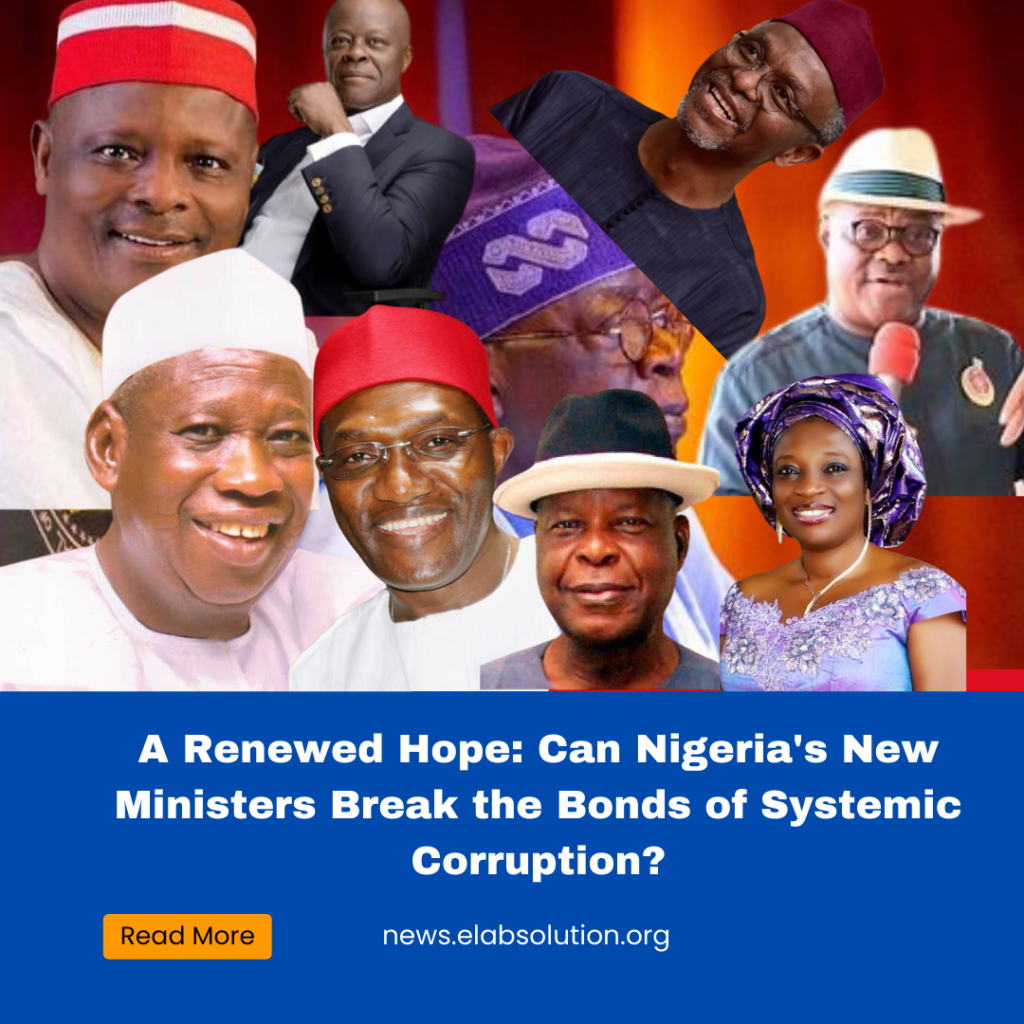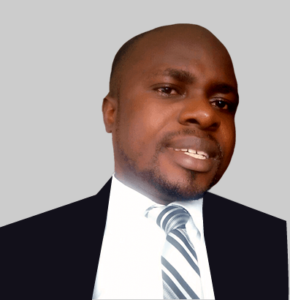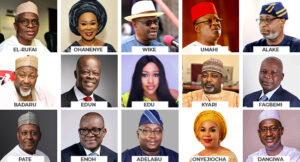The Task Ahead: Addressing Corrupt Governance and Leadership Part 1
As Nigeria’s new President begins to assemble a team of ministers to realize the Renewed Hope Agenda, the mammoth task that awaits these chosen leaders becomes apparent. In the face of historical corruption, economic stagnation, widespread violence, and heightened religious and ethnic tensions, the responsibility on the new government is overwhelming. Nigeria, a country of unmatched potential and abundant resources, faces a pivotal moment in history as these men and women come in. This leadership transition offers an unprecedented opportunity to fundamentally reshape the trajectory of the nation, again, one burdened with a legacy of corruption, economic instability, and social discord. The ministers chosen to navigate this transformative period will grapple with these complex challenges, with a focus on the central issue of corrupt governance and leadership.
To say corruption has been a longstanding problem in Nigeria would be an understatement. A study by PricewaterhouseCoopers predicts that by 2030, the
“cost of corruption” in Nigeria could reach 37% of GDP. This cost is equated to around $1,000 per person in 2014 and nearly $2,000 per person by 2030.
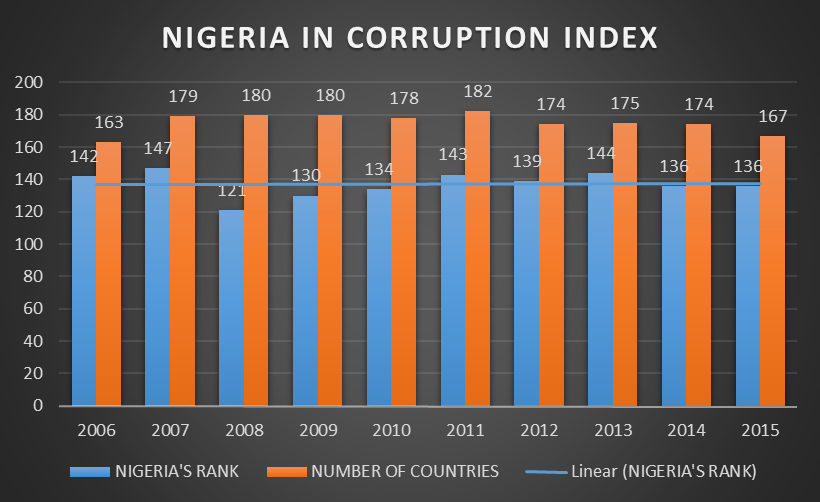 chart showing how things have progressively got worse
chart showing how things have progressively got worse (Courtesy: Nairametrics)
When this reality is translated into social impact, the numbers become even more striking: millions of Nigerians continue to live without access to basic services due to embezzlement of public funds. In a country where leadership has frequently chosen personal enrichment over the welfare of the citizenry, corruption, understandably, casts a long shadow. The recent allotment of $70 billion to the House of Rep members from the $819bn palliatives fund goes to say that the government is yet to set his priority right as regards her citizenry.
This grim reality of corruption is by no means an exclusively Nigerian issue. Other nations, both within Africa and beyond, have faced similar challenges. Kenya, for example, has grappled with extensive graft allegations, leading to the term “state capture”
. State capture is a type of systemic political corruption in which private interests significantly influence a state’s decision-making processes to their own advantage. The
Global Corruption Barometer published by Transparency International is the largest survey in the world tracking public opinion on corruption. It surveys 114,000 people in about 180 countries on their view of corruption. In 2019, it ranked South Africa as the country with the highest bribery rate in Sub-Saharan Africa. Globally, Brazil’s Operation Car Wash, an ongoing investigation into a gargantuan corruption scandal, illustrates that corruption is a universal issue that demands urgent attention.
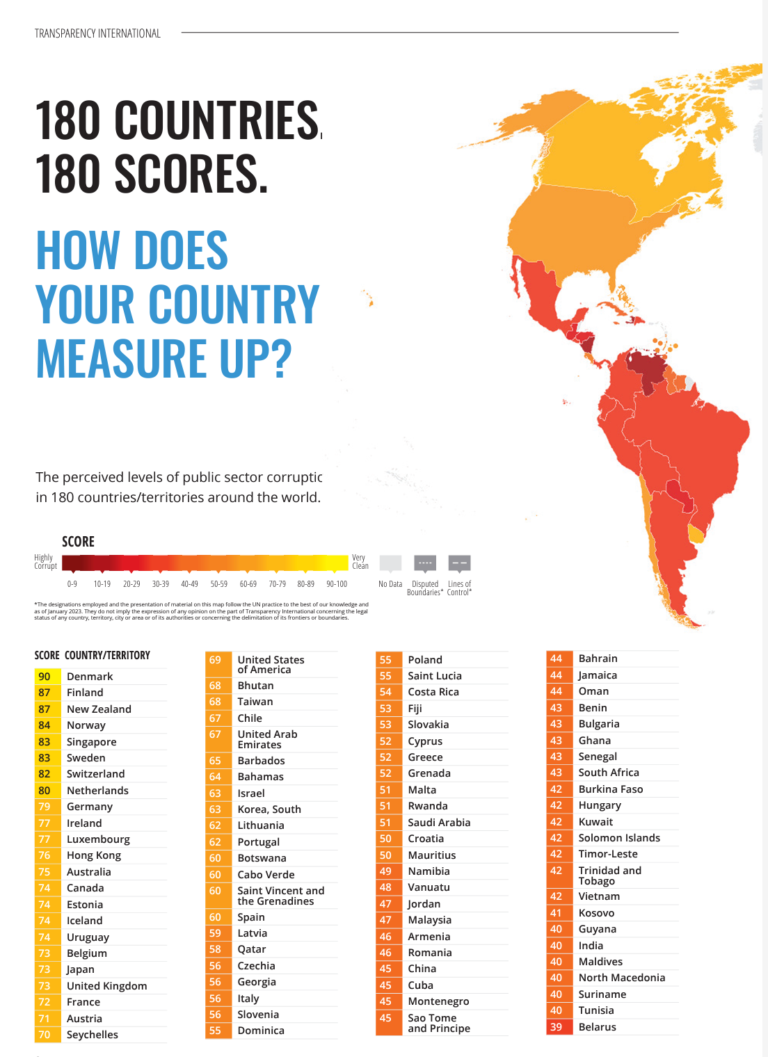
The new Nigerian ministers must embody a radical departure from this past where it has become so disheartening and shameful to hear the names of such influential figures as Diezani Alison-Madueke, Stella Oduah, Sambo Dasuki, Abba Moro, Femi Fani-Kayode, Bello Haliru Mohammed, Bukola Saraki, etc at the center of grand corruption allegations in Nigeria. These new breeds are tasked with ushering in a new era of governance where transparency, accountability, and integrity form the bedrock of their approach. They will need to foster an administration that is an antithesis to the opacity and nepotism that have characterized Nigeria’s political history.
In a country where leadership has frequently chosen personal enrichment over the welfare of the citizenry, corruption, understandably, casts a long shadow. The recent allotment of 70 billion naira to the House of Rep members from the $819bn palliatives fund goes to say that the government is yet to set his priority right as regards her citizenry
Drawing inspiration from nations that have made considerable strides against corruption can provide a practical roadmap. Countries like Rwanda and Botswana have made significant progress by promoting transparency, enforcing stringent anti-corruption measures, and cultivating a culture of accountability. Similarly, outside Africa, countries such as Singapore and Denmark consistently rank high on Transparency International’s Corruption Perceptions Index (
https://www.transparency.org/en/cpi/2022), thanks to robust institutional frameworks that deter corruption.

But good governance goes beyond just reducing corruption. Our new ministers alongside the Presidency must also address Nigeria’s flawed electoral process, which is fraught with vote buying, intimidation, and manipulation. The recent 2023 elections are a blinding spectacle to behold! No nation can rise with such glaring crimes and manipulations. Singapore’s strict rules on electoral conduct, including severe penalties for corruption, offer a potential model for Nigeria. By enforcing a stringent legal framework that criminalizes vote buying and implements secure and transparent voting processes, Nigeria can ensure the integrity of its democracy.
As new ministers chart the path forward, they must remember that change is a process, not an event. In the words of Nelson Mandela, “After climbing a great hill, one only finds that there are many more hills to climb.” This transition period presents a significant opportunity to lay the groundwork for a Nigeria that is governed with integrity, transparency, and respect for the rule of law.
As new ministers chart the path forward, they must remember that change is a process, not an event. In the words of Nelson Mandela, ‘After climbing a great hill, one only finds that there are many more hills to climb.’ This transition period presents a significant opportunity to lay the groundwork for a Nigeria that is governed with integrity, transparency, and respect for the rule of law
The journey towards a Nigeria that embodies transparency, accountability, and democracy will not be smooth, nor will it be swift. Drawing on the experiences of countries both within Africa and beyond, we can chart a roadmap to a future that ensures a government by the people and for the people.
Overcoming corruption, as we have seen, is a necessary first step, but it is only a piece of the puzzle. As we move forward in this discussion, the subsequent parts of this series will delve into the other key challenges our new ministers will face: addressing economic stagnation and poverty, and combating the spiraling violence and insecurity in the country.
In the upcoming sections, we will continue this conversation by considering how our new leaders can craft policies that will empower Nigeria’s economy to thrive and lift millions out of poverty, and create a safe, secure environment for all Nigerians to live and prosper. This holistic approach is the only way we can truly usher Nigeria into a new dawn of progress and prosperity. Stay tuned as we delve into these topics in the next parts of this series.
 chart showing how things have progressively got worse (Courtesy: Nairametrics)
When this reality is translated into social impact, the numbers become even more striking: millions of Nigerians continue to live without access to basic services due to embezzlement of public funds. In a country where leadership has frequently chosen personal enrichment over the welfare of the citizenry, corruption, understandably, casts a long shadow. The recent allotment of $70 billion to the House of Rep members from the $819bn palliatives fund goes to say that the government is yet to set his priority right as regards her citizenry.
This grim reality of corruption is by no means an exclusively Nigerian issue. Other nations, both within Africa and beyond, have faced similar challenges. Kenya, for example, has grappled with extensive graft allegations, leading to the term “state capture”. State capture is a type of systemic political corruption in which private interests significantly influence a state’s decision-making processes to their own advantage. The Global Corruption Barometer published by Transparency International is the largest survey in the world tracking public opinion on corruption. It surveys 114,000 people in about 180 countries on their view of corruption. In 2019, it ranked South Africa as the country with the highest bribery rate in Sub-Saharan Africa. Globally, Brazil’s Operation Car Wash, an ongoing investigation into a gargantuan corruption scandal, illustrates that corruption is a universal issue that demands urgent attention.
chart showing how things have progressively got worse (Courtesy: Nairametrics)
When this reality is translated into social impact, the numbers become even more striking: millions of Nigerians continue to live without access to basic services due to embezzlement of public funds. In a country where leadership has frequently chosen personal enrichment over the welfare of the citizenry, corruption, understandably, casts a long shadow. The recent allotment of $70 billion to the House of Rep members from the $819bn palliatives fund goes to say that the government is yet to set his priority right as regards her citizenry.
This grim reality of corruption is by no means an exclusively Nigerian issue. Other nations, both within Africa and beyond, have faced similar challenges. Kenya, for example, has grappled with extensive graft allegations, leading to the term “state capture”. State capture is a type of systemic political corruption in which private interests significantly influence a state’s decision-making processes to their own advantage. The Global Corruption Barometer published by Transparency International is the largest survey in the world tracking public opinion on corruption. It surveys 114,000 people in about 180 countries on their view of corruption. In 2019, it ranked South Africa as the country with the highest bribery rate in Sub-Saharan Africa. Globally, Brazil’s Operation Car Wash, an ongoing investigation into a gargantuan corruption scandal, illustrates that corruption is a universal issue that demands urgent attention. The new Nigerian ministers must embody a radical departure from this past where it has become so disheartening and shameful to hear the names of such influential figures as Diezani Alison-Madueke, Stella Oduah, Sambo Dasuki, Abba Moro, Femi Fani-Kayode, Bello Haliru Mohammed, Bukola Saraki, etc at the center of grand corruption allegations in Nigeria. These new breeds are tasked with ushering in a new era of governance where transparency, accountability, and integrity form the bedrock of their approach. They will need to foster an administration that is an antithesis to the opacity and nepotism that have characterized Nigeria’s political history.
In a country where leadership has frequently chosen personal enrichment over the welfare of the citizenry, corruption, understandably, casts a long shadow. The recent allotment of 70 billion naira to the House of Rep members from the $819bn palliatives fund goes to say that the government is yet to set his priority right as regards her citizenry
Drawing inspiration from nations that have made considerable strides against corruption can provide a practical roadmap. Countries like Rwanda and Botswana have made significant progress by promoting transparency, enforcing stringent anti-corruption measures, and cultivating a culture of accountability. Similarly, outside Africa, countries such as Singapore and Denmark consistently rank high on Transparency International’s Corruption Perceptions Index (https://www.transparency.org/en/cpi/2022), thanks to robust institutional frameworks that deter corruption.
The new Nigerian ministers must embody a radical departure from this past where it has become so disheartening and shameful to hear the names of such influential figures as Diezani Alison-Madueke, Stella Oduah, Sambo Dasuki, Abba Moro, Femi Fani-Kayode, Bello Haliru Mohammed, Bukola Saraki, etc at the center of grand corruption allegations in Nigeria. These new breeds are tasked with ushering in a new era of governance where transparency, accountability, and integrity form the bedrock of their approach. They will need to foster an administration that is an antithesis to the opacity and nepotism that have characterized Nigeria’s political history.
In a country where leadership has frequently chosen personal enrichment over the welfare of the citizenry, corruption, understandably, casts a long shadow. The recent allotment of 70 billion naira to the House of Rep members from the $819bn palliatives fund goes to say that the government is yet to set his priority right as regards her citizenry
Drawing inspiration from nations that have made considerable strides against corruption can provide a practical roadmap. Countries like Rwanda and Botswana have made significant progress by promoting transparency, enforcing stringent anti-corruption measures, and cultivating a culture of accountability. Similarly, outside Africa, countries such as Singapore and Denmark consistently rank high on Transparency International’s Corruption Perceptions Index (https://www.transparency.org/en/cpi/2022), thanks to robust institutional frameworks that deter corruption.
 But good governance goes beyond just reducing corruption. Our new ministers alongside the Presidency must also address Nigeria’s flawed electoral process, which is fraught with vote buying, intimidation, and manipulation. The recent 2023 elections are a blinding spectacle to behold! No nation can rise with such glaring crimes and manipulations. Singapore’s strict rules on electoral conduct, including severe penalties for corruption, offer a potential model for Nigeria. By enforcing a stringent legal framework that criminalizes vote buying and implements secure and transparent voting processes, Nigeria can ensure the integrity of its democracy.
As new ministers chart the path forward, they must remember that change is a process, not an event. In the words of Nelson Mandela, “After climbing a great hill, one only finds that there are many more hills to climb.” This transition period presents a significant opportunity to lay the groundwork for a Nigeria that is governed with integrity, transparency, and respect for the rule of law.
As new ministers chart the path forward, they must remember that change is a process, not an event. In the words of Nelson Mandela, ‘After climbing a great hill, one only finds that there are many more hills to climb.’ This transition period presents a significant opportunity to lay the groundwork for a Nigeria that is governed with integrity, transparency, and respect for the rule of law
The journey towards a Nigeria that embodies transparency, accountability, and democracy will not be smooth, nor will it be swift. Drawing on the experiences of countries both within Africa and beyond, we can chart a roadmap to a future that ensures a government by the people and for the people.
Overcoming corruption, as we have seen, is a necessary first step, but it is only a piece of the puzzle. As we move forward in this discussion, the subsequent parts of this series will delve into the other key challenges our new ministers will face: addressing economic stagnation and poverty, and combating the spiraling violence and insecurity in the country.
In the upcoming sections, we will continue this conversation by considering how our new leaders can craft policies that will empower Nigeria’s economy to thrive and lift millions out of poverty, and create a safe, secure environment for all Nigerians to live and prosper. This holistic approach is the only way we can truly usher Nigeria into a new dawn of progress and prosperity. Stay tuned as we delve into these topics in the next parts of this series.
But good governance goes beyond just reducing corruption. Our new ministers alongside the Presidency must also address Nigeria’s flawed electoral process, which is fraught with vote buying, intimidation, and manipulation. The recent 2023 elections are a blinding spectacle to behold! No nation can rise with such glaring crimes and manipulations. Singapore’s strict rules on electoral conduct, including severe penalties for corruption, offer a potential model for Nigeria. By enforcing a stringent legal framework that criminalizes vote buying and implements secure and transparent voting processes, Nigeria can ensure the integrity of its democracy.
As new ministers chart the path forward, they must remember that change is a process, not an event. In the words of Nelson Mandela, “After climbing a great hill, one only finds that there are many more hills to climb.” This transition period presents a significant opportunity to lay the groundwork for a Nigeria that is governed with integrity, transparency, and respect for the rule of law.
As new ministers chart the path forward, they must remember that change is a process, not an event. In the words of Nelson Mandela, ‘After climbing a great hill, one only finds that there are many more hills to climb.’ This transition period presents a significant opportunity to lay the groundwork for a Nigeria that is governed with integrity, transparency, and respect for the rule of law
The journey towards a Nigeria that embodies transparency, accountability, and democracy will not be smooth, nor will it be swift. Drawing on the experiences of countries both within Africa and beyond, we can chart a roadmap to a future that ensures a government by the people and for the people.
Overcoming corruption, as we have seen, is a necessary first step, but it is only a piece of the puzzle. As we move forward in this discussion, the subsequent parts of this series will delve into the other key challenges our new ministers will face: addressing economic stagnation and poverty, and combating the spiraling violence and insecurity in the country.
In the upcoming sections, we will continue this conversation by considering how our new leaders can craft policies that will empower Nigeria’s economy to thrive and lift millions out of poverty, and create a safe, secure environment for all Nigerians to live and prosper. This holistic approach is the only way we can truly usher Nigeria into a new dawn of progress and prosperity. Stay tuned as we delve into these topics in the next parts of this series.


